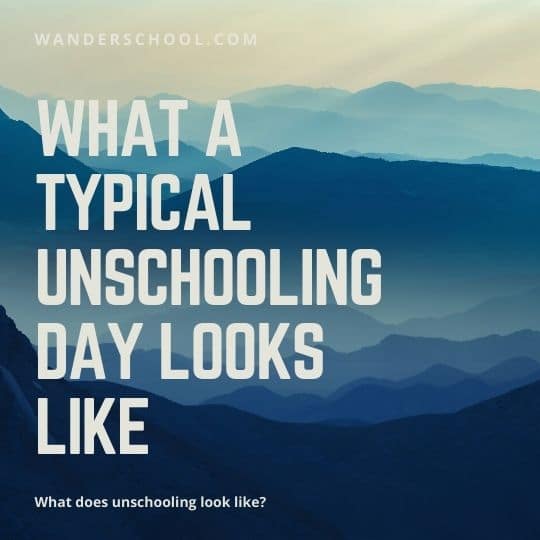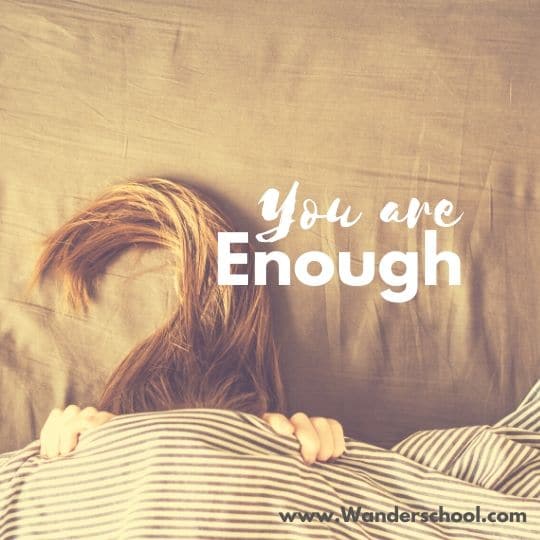I’m often asked what a typical unschooling day looks like.
What does a typical unschooling day look like?
Affiliate Links Disclosure: My posts sometimes contain affiliate links, which mean that if you click on them and make a purchase or sign up for an offering, I may earn a commission, at no added cost to you. I received no compensation for writing this post, and it reflects my own experiences, research, and opinions. You can read my my privacy policy here. Thank you so very much for reading my blog!
There is no one answer
Quite simply, there is no one answer to this question. That’s because no two ‘homeschooling‘ or ‘unschooling’ families unschool the same way. And even the same ‘unschooling’ family doesn’t always ‘unschool’ the same way all of the time.
But if there’s any strand or glimmer of commonality in what a typical unschooling day looks like among unschoolers, it is that the child’s interests lead the day.
A Typical Unschooling Day in My Family is Anything But Typical
In my family, a typical unschooling day with three teens and one tween, varies depending on where we happen to be. A typical day also varies depending on what the kids generally hope to accomplish.
If you follow the Wanderschool blog, you already know that we spend a lot of time on the road traveling and adventuring, like in the mountains. So, if we have adventure goals in mind, that might influence a typical day.
We also spend a lot of time thinking and talking about dreams–and how to pursue or implement them. Accordingly, what unschooling looks like any given day in our family also often revolves around those dreams.
What is Unschooling?
Before diving into more on what unschooling looks like, let’s first talk about what it is and what it isn’t.
Unschooling in basic terms is interest-led learning. That interest is child led. Some people think of unschooling as life schooling. As in, learning that organically happens while living or doing life.
READ MORE: To learn more about the definition of unschooling and perspectives about unschooling, be sure to come back and read my other guides on unschooling:
Year Round Unschooling
In our family, learning never stops. It most definitely doesn’t run on a school calendar. It’s fair to say, we ‘school’–errr…unschool–year round. 365 days a year. Yep, even on Christmas Day.
Every conversation, every news headline, every interaction, every new book, documentary, tv show, gadget, toy, game, song, or place offers a learning opportunity.
We spend a lot of time together as a family. Whether we are on trails in the Alps hiking together, visiting a museum in Spain, or wandering the streets of New York City, we spend our days talking, asking and answering questions, and ‘filling our buckets’ with information, new perspectives, knowledge, and cool experiences.
Each New Day is an Opportunity to Soak Up Something
The kids and I pretty much look at each new day as an opportunity to soak up as much of everything as we can. To know something more, even if just a small bit more, at the end of the day than when we began it.
Kids are like sponges. Give them opportunities, resources, and positive support from which they can learn and discover, and they will. They will soak it all up.
Really.
This becomes apparent when you unschool. In case you’re wondering, it might not seem obvious immediately or in the beginning, but it will. Kids want to learn. They are also more capable of learning, inquiring, imagining, and teaching themselves than we (schooled) parents can easily believe–at least until we’re immersed ourselves in the unschooling world.
What a Typical Unschooling Day Looks Like
When we are at home, a typical unschooling day with three teenagers and a tween sometimes looks like this:
In the morning, my kids often wake early. Usually they are wide awake and busily engaged in their own activities before I get up. It is quite typical for me to awake to amazing smells coming from the kitchen, as my kids love to cook, book, and create their own recipes, .
So, my teens and tween often get up early, get dressed, game, check social media, watch a favorite tv show episode, and then make themselves (though typically they cook together) breakfast. French toast, crepes, and pancakes are morning favorites. They each have their breakfast specialties. My tween rocks French toast making.
Typical Mornings Filled with Interest-Led Learning
After eating, and usually by 9am they typically begin doing something that they’ve wanted to do. See the dreams and goals mention above.
My Teens
For one of my teens, that typically means computer programming. He loves to fill his days learning new programming languages, programming, and graphic design. He also adds other ‘schooling’ projects of interest to him throughout his day. For example, he recently completed a geometry course that he found online–because he ‘felt like’ learning geometry. He’s also no stranger to teaching himself science because he loves it.
Another one of my teens, typically spends her mornings developing recipes, posting to her blog, practicing her guitar, and working on her language studies (she’s currently studying French and Hindi…yep, Hindi, her interest). Sometimes she’s busy and engaged taking an Outschool class or another online course. It’s also not unusual to find her writing a research paper on some interesting topic–she has a knack for churning out essays and she loves to research.
Another one of my teens, who graduated high school at sixteen, typically spends her mornings studying (she’s in university now), writing, practicing yoga, and working on her blog, including editing her own videos.
My Tween
My tween typically spends the morning working on ‘core lessons’ typically chosen by him, but typically with suggestions by me to help guide him. For example, to help with his handwriting and spelling, I might encourage him to do some copy work from a book he read the night before. He enjoys quotes and poetry, such as Shel Silverstein’s Where the Sidewalk Ends, so he might spend some time copying verses in his journal.
For social studies, I sometimes give him suggestions based on what he has expressed interest in learning about. For example, he is very interested in the news and current events, so he might read headlines online, read from a relevant book, or watch a YouTube video or documentary to further his knowledge. He recently read Trevor Noah’s Born a Crime (Young Adult Version) and took it upon himself to do a lot of research related to the book, such as Googling Soweto and learning more about the township.
Afternoons Filled with Interest-Led Adventures
Typical afternoons often reflect time away from the kitchen, dining room table, or living room–adventures. We love to spend time outside!
Most afternoons, we try to get on trails for a hike or trail run. Pre-Covid, typical afternoons were spent going to museums, workshops, meet-ups, or other ‘learning’ events. Depending on the time of year and where we are, many afternoons or evenings also involve sports or extracurricular activities, like swimming, windsurfing, or Nordic skiing. My oldest teen (and my second oldest) spend a lot of afternoons running.
If we’re home in the afternoon during the summer, my kids are typically found somewhere outside. My tween likes to garden, so it’s typical to find him in the garden watering, harvesting veggies, or replanting. When local kids are around in summer or during holidays, it’s typical to find my crew playing soccer or games with neighborhood kids.
Evenings…And They’re Back at It
By the time evening rolls around, my kids are usually back at it…doing the things they love or have interest teaching themselves.
Lucky for me, my kids love to cook. They often spend time during the day scheming up cool dinner recipes, so when dinner time rolls around, my crew is typically gathered in the kitchen talking, prepping food, and making healthy, made-from-scratch, real food.
After dinner, they typically return to computer programming, social media projects, arts & crafts, guitar practice, yoga workouts, reading, writing, texting friends, and watching documentaries or fun tv shows.
They typically self-decide when they want to go to bed. My tween and I typically read together before he dozes off. Sometimes he chooses to spend time drawing or journaling before bed. My teens typically read or write before they go to bed. For example, one of my teens likes to write poetry, letters, or texts. Another likes to compose song lyrics before calling it a night.
Always Busy Learning
The bottom line is this: my unschoolers are typically very busy learning and doing throughout a day. Their natural curiosity and self-led interest in soaking up their world comes through every. single. day.
Whether we are at home, on the road, on a bus, in an airport, in a coffeeshop, or waiting in the car, I can be certain that my crew is soaking up whatever they can.
Wherever we go, my kids typically carry a backpack filled with their electronics, notebooks, and books. They are equipped for learning on the fly, wherever. Whenever. Rarely willing to waste a minute to learn.
The Best Part of A Typical Day of Unschooling
The best part of unschooling and interest led-learning: my kids rarely, if ever, complain about learning or ‘schoolwork’ .
When you’re spending your time discovering and learning about things you love, how can you really complain anyway?
I would love to hear your thoughts. Are you thinking about unschooling? Are you currently unschooling your child? What does your typical day look like? Drop a comment below.
Follow Julie on Social Media! 😉
Related Posts You May LOVE
Read This When Homeschooling has You in Tears
Subscribe to the Wanderschool Newletter. Get the latest travel news delivered right to your inbox.





I loved reading this. I have done homeschool evaluations for some unschoolers and not all kids are intrinsically motivated, so unschooling doesn’t work for everyone if the parent isn’t there to facilitate it. Your kids are very motivated and it sounds like they found their passions and keep exploring to find more. Great job mama!
Hi Kim, Thank you so much for the kind words! Julie
I enjoyed reading this! We’re still pretty new to homeschooling but my oldest is delayed and had such bad experiences in school that she was resistant to learn and said she would just fail anyways. So I threw out the curriculum and I let her follow her interests and was amazed at what happened next.
She sings, plays harmonica, sews clothes, cooks, explores outside, climb trees, swims in the creek (we live in the country), write stories, science experiments and kidnap slugs and toads (she loves slimy creatures!) She asked to learn German, cursive and typing. I decided to help her with math by teaching her fractions with pizza slices, measuring cups, or whatever I was cooking. Had her write recipes and letters to elderly family members. Now she wants me to subscribe to the newspaper so we can discuss the headlines.
We’re still in the early stages and finding our groove, but I can’t believe the change in her and now she is starting to love learning again and that makes me so happy!
Hello, I have been homeschooling for 6 years now… And have tried so many different ways. I am curious about the core studies… How do you make sure someone is learning the math they need to graduate if they don’t like math? Or the same with reading? I have one daughter who is a math wiz and another who loves to read and write. It doesn’t seem balanced if they only learn what they want to learn. Thank you! I am getting burned out a little and really could use some ideas. Unschooling sounds like a really nice way of changing it up especially as my kids are getting older.
Hi Raschele, Thank you so much for taking the time to write. In my experience, math is definitely a tricky point. With my own children, the older they have become, and as they identified their own personal study interests (and future goals), we’ve discussed how essential math often is for admission to colleges/universities. Topics like advanced math, e.g., graphing, advanced algebra, pre-calculus, aren’t exactly easily or organically learned in daily life at home without books or online resources, as were say the basic four processes and fractions in their earlier years. Accordingly, during the late middle school and high school years, my children have found math programs they enjoy. Teaching Textbooks (online) is one favorite. Keeping with the spirit of unschooling, my children choose their schedule to do the math work, choose the subject they want to study when, and based on their own interests and future goals (e.g., one wants to study engineering), they’ve taken the initiative to find out what they will need to do to get in to programs; accordingly, they’ve done the research on their own to know they have to learn advanced math, so they don’t complain about doing it. To help balance it out, you could find some short online math courses on Outschool, Udemy, or EdX, and suggest your daughter choose one that seems somewhat appealing from time to time. For example, there are some terrific, inspiring teachers on Outschool that have helped my children fall in love with subjects that they didn’t think they wanted to learn. I’d recommend keep throwing in new resources whenever possible. I hope this helps. Keep up the awesome work, mama!
Hi Julie!
I’m so very new to unschooling. We just took our 2 boys (5 and 9) out, this year. We also have a 2 year-old. I feel so lost and helpless because my children love to just watch TV and play video games. When asked what they would like to learn, they don’t really know. They are still very young, so the motivation doesn’t seem to be there. I reeeeeaaally want unschooling to work out for our family because we’re pretty free-spirited and I believe in awesomeness of unschooling; but what could or should I do to get the ball rolling in the right direction? This is, all, so new and overwhelming. 😞
Thanks so much…
I just found your Blog and LOVE it. Thank you for going into information and suggestions. I am unschooling our 9 and 13 year old boys. Sometimes it really is just video games and youtube, but as the months have gone on (since November) they have started to show specific interests. My 9yo loves science and cooking. My 13yo loves blacksmithing. It’s something he chose and picked up really quickly too. As time goes on they are settling into their learning, we don’t call is lessons or school or anything, it’s just learning. Every so often I have reservations, especially when questioned about my reasoning and how they are going to ‘keep up’ with kids in school, BUT I see how they are growing and are so much more happier now than when in school. I encourage those that aren’t seeing ‘results’ or that there is no initiative, it takes a little time for them to find themselves again after being in a system that told them what and how to learn <3